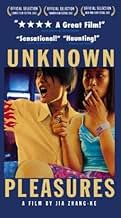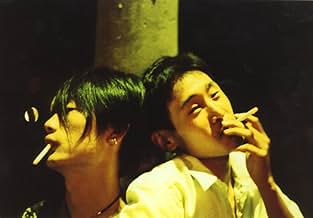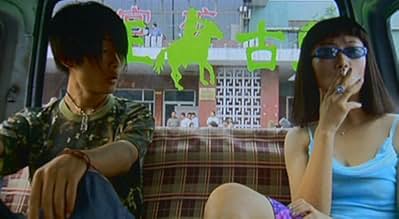IMDb RATING
6.8/10
2.7K
YOUR RATING
Two unemployed Chinese teenagers have trouble resisting the temptations of the Western world.Two unemployed Chinese teenagers have trouble resisting the temptations of the Western world.Two unemployed Chinese teenagers have trouble resisting the temptations of the Western world.
- Awards
- 2 wins & 5 nominations total
Limin Wang
- The Karaoke Customer
- (as Wang Li Min)
Juan Antonio Samaranch
- Self
- (archive footage)
- (uncredited)
Jia Zhang-ke
- Man singing in street
- (uncredited)
- Director
- Writer
- All cast & crew
- Production, box office & more at IMDbPro
Featured reviews
There isn't an ounce of joy or spark in these characters, who I'm pretty sure don't crack a single smile throughout the film. They manage to smoke a million cigarettes though. Not that there's anything to smile about, and that's the point. There is no beauty anywhere, nor is there hope. The landscape is a wasteland, the buildings are ugly or in ruins, and jobs are few. One says there is no future, and the other says that 30 years is plenty for a lifetime. Even when they're alone with women, they look forlornly off to the side or curl up in the fetal position.
This is a heavy neorealist type of film, reflecting poor parts of China that were still attempting to modernize in this time period. Who knows, as China's economic strength has continued to rise, maybe this film is already looked upon as quaint, or will be soon. American cultural references (e.g. Pulp Fiction) are known by the characters in the film, but it's from a distance, and things like the modern dance moves that have been picked up seem pretty tepid. Meanwhile, a single American dollar is viewed as quite a find, and a can of Coke is a treat. It certainly reminded me of the blessings in my life.
The scene that was most powerful for me was when the young woman who sings and dances (Zhao Tao) is trying to leave her boyfriend's company. Again and again she gets up and tries to exit, and again and again he pushes her back into her seat, and it seems such a perfect metaphor for the cycle of abuse in these kinds of relationships. Later we see he's also given her a black eye.
Given the dreary view the film shows of China, and the nihilistic attitude it takes towards the future, it was a little surprising to me that it wasn't censored more by the government. We see the power of the State on small television sets cracking down on the Falun Gong, what seems like a forced confession, and in real life when a policeman tells one of the guys that the punishment for robbing a bank is death. There is a lottery in place that may be a way of instilling a larger hope in people's minds than the infinitesimal chance of winning would justify, perhaps not unlike American lotteries. There is also a new highway project being built and great fanfare when Beijing is announced as the home of the 2008 Olympics. I guess all of these things can be viewed as in keeping with the government's interests, but in light of all the shabby surroundings and the dismal future these two guys have, they seem pretty sorrowful.
The film is meaningful and I admire director Jia Zhangke for having worked in an underground, indie type manner to produce a view of honesty and truth. I didn't rate the film higher because it's so depressing that I wouldn't want to look for it again anytime soon.
This is a heavy neorealist type of film, reflecting poor parts of China that were still attempting to modernize in this time period. Who knows, as China's economic strength has continued to rise, maybe this film is already looked upon as quaint, or will be soon. American cultural references (e.g. Pulp Fiction) are known by the characters in the film, but it's from a distance, and things like the modern dance moves that have been picked up seem pretty tepid. Meanwhile, a single American dollar is viewed as quite a find, and a can of Coke is a treat. It certainly reminded me of the blessings in my life.
The scene that was most powerful for me was when the young woman who sings and dances (Zhao Tao) is trying to leave her boyfriend's company. Again and again she gets up and tries to exit, and again and again he pushes her back into her seat, and it seems such a perfect metaphor for the cycle of abuse in these kinds of relationships. Later we see he's also given her a black eye.
Given the dreary view the film shows of China, and the nihilistic attitude it takes towards the future, it was a little surprising to me that it wasn't censored more by the government. We see the power of the State on small television sets cracking down on the Falun Gong, what seems like a forced confession, and in real life when a policeman tells one of the guys that the punishment for robbing a bank is death. There is a lottery in place that may be a way of instilling a larger hope in people's minds than the infinitesimal chance of winning would justify, perhaps not unlike American lotteries. There is also a new highway project being built and great fanfare when Beijing is announced as the home of the 2008 Olympics. I guess all of these things can be viewed as in keeping with the government's interests, but in light of all the shabby surroundings and the dismal future these two guys have, they seem pretty sorrowful.
The film is meaningful and I admire director Jia Zhangke for having worked in an underground, indie type manner to produce a view of honesty and truth. I didn't rate the film higher because it's so depressing that I wouldn't want to look for it again anytime soon.
Unknown Pleasures is the first Jia Zhang Ke film that I have seen and it is excellent. The setting is a town in the north of China, but it could be anywhere in the developing world - India, Argentina or South Africa, for example - where neo liberal economic policies have benefitted the urban elite, but created dislocation for millions of others. The director undoubtedly has a deep social conscience.
The film focuses on several young people, members of China's "new new" generation. As the films progresses, we see what the new world order offers them - US currency, American pop culture, the 2008 Olympics, new super highways - contrasted with the reality - few opportunities for young people, laid off state factory workers and a general degradation of moral values. The message is clear: the new world order offers common people everything in return for giving up traditional ways of life, but actually delivers little of substance. As Bin Bin puts it when he finds out that his girlfriend is going to Beijing to study international trade: "WTO is nothing. Just a trick to make some cash."
The social realist style - it has a bit of a documentary look to it - and the pop song which the film is named after and which features prominently in it (Ren Xiao Yao - the lyrics speak about youth alienation, particularly a desire for freedom and pleasure) also provide a cutting edge look and feel. The song is emotive and will strike a chord with those who like explorations of youth alienation.
However, the film, as befits the political and artistic climate in China, is very subtle and understated, and may escape those who have little knowledge of current affairs in China or an insensitivity to the economic and social dislocation that is taking place outside the big cities (this is not a good date movie for the corporate Western expat and his urban Chinese girlfriend who measure progress by the number of new condos and Western restaurants in Shanghai).
This is great indie filmmaking, though, and I would particularly recommend it to socially and politically aware twenty and thirtysomethings who like artistic expression that is intelligent, socially conscientious and cutting edge.
The film focuses on several young people, members of China's "new new" generation. As the films progresses, we see what the new world order offers them - US currency, American pop culture, the 2008 Olympics, new super highways - contrasted with the reality - few opportunities for young people, laid off state factory workers and a general degradation of moral values. The message is clear: the new world order offers common people everything in return for giving up traditional ways of life, but actually delivers little of substance. As Bin Bin puts it when he finds out that his girlfriend is going to Beijing to study international trade: "WTO is nothing. Just a trick to make some cash."
The social realist style - it has a bit of a documentary look to it - and the pop song which the film is named after and which features prominently in it (Ren Xiao Yao - the lyrics speak about youth alienation, particularly a desire for freedom and pleasure) also provide a cutting edge look and feel. The song is emotive and will strike a chord with those who like explorations of youth alienation.
However, the film, as befits the political and artistic climate in China, is very subtle and understated, and may escape those who have little knowledge of current affairs in China or an insensitivity to the economic and social dislocation that is taking place outside the big cities (this is not a good date movie for the corporate Western expat and his urban Chinese girlfriend who measure progress by the number of new condos and Western restaurants in Shanghai).
This is great indie filmmaking, though, and I would particularly recommend it to socially and politically aware twenty and thirtysomethings who like artistic expression that is intelligent, socially conscientious and cutting edge.
Learning that this film is from the makers of the tedious PLATFORM is not encouraging and the new work has the same murky color and long, unedited shot coverage.
However this one benefits from the stronger narrative elements - nihilistic kids turn to crime as their ambitions are thwarted, no mating with the traveling show chantoosie or becoming a Beijing soldier - along with the detailed account of joyless small town Datong Province life in decaying buildings where finding a US dollar in the liquor bottle the entertainers are plugging represents sudden fortune.
In the line of BEIJING BASTARDS and less engaging that GE GE/ BROTHER which covers much the same ground, this still suggests that the Chinese cinema may be evolving a sub-surface layer of effective, critical entertainment.
However this one benefits from the stronger narrative elements - nihilistic kids turn to crime as their ambitions are thwarted, no mating with the traveling show chantoosie or becoming a Beijing soldier - along with the detailed account of joyless small town Datong Province life in decaying buildings where finding a US dollar in the liquor bottle the entertainers are plugging represents sudden fortune.
In the line of BEIJING BASTARDS and less engaging that GE GE/ BROTHER which covers much the same ground, this still suggests that the Chinese cinema may be evolving a sub-surface layer of effective, critical entertainment.
I'm confused as to why people would still give the pleasant peasant fables of Zhang Yimou house-room now we're offered a view of intense, complex, and contemporary Chinese cinema like this. I adored the extreme negativity of this film's most repetitive moments: Xiao Ji getting slapped about the face ("having a good time?" "yes" "having a good time?" "yes" "having a good time?" "yes" "having a good time?" "yes"...) or trying repeatedly to drive up a slight slope on his motorbike. The very repeatability of film seems to highlight the way that only this silly, essentially boring medium gets at what's going on when stuff happens, in capitalist China as well as at home...
I saw this film at the IFP LA Film Festival on June 16, 2003. It started out pretty well, but became aimless and sort of meandered. I couldn't root for any of the characters. The background of economically depressed mainland China is interesting, but only for a while. After half an hour, I wanted characters I cared about, but this movie didn't have any. It's not that the young actors weren't talented, it's just that the script was anti-climatic and didn't leave me wanting more, I just wanted the movie to end.
Did you know
- TriviaMandarin title refers to a song by Richie Jen
- Quotes
Mr. Ren: Welcome to auditions for the Mongolian King Liquor Troupe! Please applaud our city's famous singer and dancer, Miss Zhao Qiao Qiao, in her modern dance number titled "Unknown Pleasures". The performance reminds us the Mongolian King spirits! Drink Mongolian King! Drink Mongolian King!
- ConnectionsFeatures Le roi des singes (1961)
Details
Box office
- Gross US & Canada
- $11,254
- Opening weekend US & Canada
- $3,628
- Mar 30, 2003
- Gross worldwide
- $55,901
Contribute to this page
Suggest an edit or add missing content




















